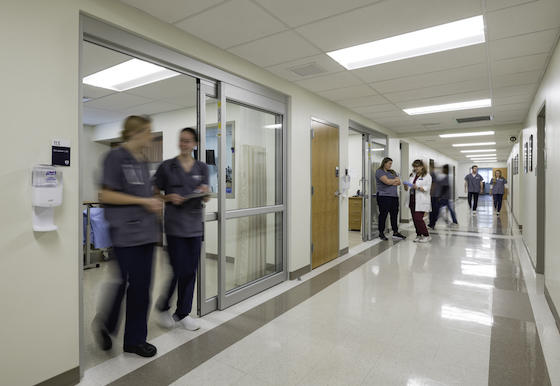
About this Program
The Master of Science in Nursing (MSN) program at Hood College is designed for registered nurses seeking to advance their careers by becoming an Adult-Gerontology Primary Care Nurse Practitioner (AGPCNP). This online, asynchronous program is designed for working professionals seeking to expand their scope of practice and provide comprehensive, evidence-based to the adolescent, adult, and geriatric population, ages 13 and up.
The MSN program is available on a full- or part-time basis and can typically be completed within four to six semesters. Courses are delivered online for added flexibility and convenience. Students will also complete a practicum with a preceptor.
Program Overview
Tuition & Fees
Funding Opportunities
Degrees Offered
- MSN
Department Offering
Related Graduate Programs
Are you ready to go further?
- Bachelor’s degree with a major in nursing from an accredited (ACEN or CCNE) college or university
- Undergraduate minimum cumulative grade point average of 3.0
- All college coursework must be submitted
- Completion of college-level statistics course, or equivalent as approved by Program Director, with a grade of C (70%) or higher, is preferred at the time of application and required to be completed in first semester.
- Hold an unencumbered and active R.N. license in the U.S.
- Our program is designed for nurses in practice. Applicants must have a minimum of 1-2 years of recent full-time experience in a direct patient care role as a Registered Nurse (RN).
- Current Curriculum Vitae/Resume
- Please include education, work experience, and certifications
- Essay/purpose statement (300-500 words) answering the following questions:
- Why do you want to pursue your MSN?
- What makes you the best candidate for our graduate nursing program?
- Why have you chosen Hood College?
- Why did you choose the Adult-Gero Primary Care NP track and how will this degree/certification help you better impact the community, the nursing profession, health care and society?
- Candidate interview with Admission Committee
- At the discretion of the program advisor, an interview may be required to clarify professional background and training.
- Letter of recommendations (not required)
- 1 to 2 letters of recommendation (personal and/or professional)
How to prepare for the interview:
- Review AACN Essentials
- Attend a Hood College Graduate School open house
- Consider the following information:
- Understand the Adult-Gerontology Primary Care Nurse Practitioner (AGPCNP) Role and MSN degree
- Life experiences that have influenced your interest in APRN Role
- Your strengths and how they contribute to the field of nursing
- Challenges you’ve encountered in the nursing profession
- Your personal/professional goals and commitment to the profession
Next Steps:
After reviewing and evaluating all required admission materials, including an interview if applicable, the admissions committee will deliberate and provide a decision approximately two (2) weeks after all application materials have been submitted and processed.
The MSN–Adult-Gerontology Primary Care Nurse Practitioner (AGPCNP) track requires the completion of 15 core course credits along with concentration-specific coursework. This 48-credit program, which includes 750 practicum hours across three courses, is designed to meet the clinical requirements for post-graduation certification as an AGPCNP. Our streamlined plan of study allows you to enroll in full-time (2 years) or part-time (3 years and 4 years) formats, with courses offered year-round (fall, spring, and summer).
Core Courses
| Course | Credits | Description |
| NUR 500 Theoretical Foundations of Advanced Practice and Role Development | 3 | Theoretical foundations of advanced nursing practice are examined, including the evolution of nursing knowledge and theoretical structures from other disciplines. The role advanced practice nurses play in the healthcare system will be explored. |
| NUR 501 Healthcare Systems, Policy and Advocacy | 3 | Explore the development of healthcare systems and health policy as well as the influence of ethics and policy in population health, nursing practice, advocacy and social justice in healthcare. |
| NUR 502 Evidence-Based Practice and Research Methods | 3 | Develop expanded knowledge of research methods and evidence-based practice to analyze and translate evidence for practice improvement and innovation to improve health and nursing outcomes. Pre-req: Undergraduate Statistics. |
| NUR 503 Leadership in Nursing Practice | 3 | Study of organizations, systems and the advanced practice role, including leadership, quality, safety, finance and healthcare technology. |
| NUR 504 Healthcare Informatics and Technology | 3 | Examine the use of technology and information in healthcare alongside the influence on policy, regulation, collaboration, interprofessional practice and outcomes management. |
Adult-Gerontology Primary Care Nurse Practitioner Track
| Course | Credits | Description |
| NUR 530 Advanced Health Assessment | 3 | Develop advanced understanding of a client’s health incorporating data and information from multiple sources in order to evaluate patient health. Students learn how to integrate all the data to reason toward a diagnosis, better health and disease prevention. |
| NUR 531 Advanced Concepts in Physiology and Pathophysiology | 3 | Develop an expanded knowledge base in physiology and pathophysiology required for advanced practice, health promotion and disease prevention. |
| NUR 532 Advanced Concepts in Pharmacology | 3 | Develop advanced knowledge related to the use of pharmacotherapeutics in management of common health problems and nursing prescriptive authority as well as the development and use of clinical practice guidelines. |
| NUR 533 Adult-Gerontology Common Health Problems I | 3 | Focus on developing critical thinking and evidence-based practice to achieve AGPCNP core competencies and standards of clinical primary care. Emphasis on health promotion, disease prevention, risk reduction and assessment, diagnosis and management of common health problems among individuals, families and communities specific to the AGPCNP role. |
| NUR 534 Adult-Gerontology Common Health Problems II | 4 | Additional focus on developing critical thinking and evidence-based practice to achieve AGPCNP core competencies and standards of clinical primary care. Emphasis on health promotion, disease prevention, risk reduction and assessment, diagnosis and management of common health problems among individuals, families and communities specific to the AGPCNP role. |
| NUR 535 Adult-Gerontology Common and Comorbid Health Problems III | 4 | Expanding into comorbid health problems, the course focuses on developing critical thinking and evidence-based practice to achieve AGPCNP core competencies and standards of clinical primary care. Emphasis on health promotion, disease prevention, risk reduction and assessment, diagnosis and management of common health problems among individuals, families and communities specific to the AGPCNP role. |
| NUR 536 Adult-Gerontology Common and Comorbid Health Problems IV | 4 | Grounded in theory and evidence, the course focuses on synthesis of knowledge to achieve AGPCNP core competencies and standards of clinical primary care. Emphasis on health promotion, disease prevention, risk reduction and assessment, diagnosis and management of more complex and comorbid health problems among individuals, families and communities specific to the AGPCNP role. |
| NUR 596A APN Clinical Practicum I | 3 | Initial clinical practicum and seminar to develop advanced practice core competencies in a primary care clinical setting. APRN role is examined. Includes online seminar and 240 hours of clinical. |
| NUR 596B APN Clinical Practicum II | 3 | Second clinical practicum and seminar to further develop advanced practice core competencies in a primary care clinical setting. Integrates content and clinical experiences from all previous courses. Includes online seminar and 240 hours of clinical. |
| NUR 596C APN Clinical Practicum III | 3 | Synthesizes content and clinical experiences from all previous primary care didactic and practicum courses with an emphasis on considering context while providing evidence-based health promotion and maintenance as well as clinical assessment, diagnosis and management of more complex and comorbid health problems among populations, including individuals, families and communities, specific to adult-gerontology primary care practitioners. Credits include online seminar and 270 hours of clinical. |
Master of Nursing Science graduates will be able to:
- Exhibit advanced clinical knowledge and decision-making skills to provide individuals with holistic care and achieve optimal health.
- Influence health policies focusing on nursing ethics and social justice dilemmas to improve healthcare delivery.
- Analyze emerging knowledge to initiate change in diverse populations to improve healthcare outcomes.
- Appraise evidence-based practice to improve delivery of health care, health equity, nursing practice, and the nursing profession.
- Demonstrate effective communications and collaboration strategies to develop, participate, and lead interprofessional healthcare teams to enhance patient outcomes and deliver high-quality coordinated care.
- Lead innovative initiatives to provide safe, cost-effective, quality, and equitable care to diverse populations
- Evaluate use of informatics and healthcare technologies to optimize health information management.
- Promote the nursing profession and role of the Adult-Gerontology Nurse Practitioner within the healthcare system.
- Demonstrate leadership, professionalism, and a commitment to lifelong learning and professional development to advance the nursing profession, improve healthcare outcomes, and contribute to an evolving healthcare system.
21-36 Months
Average Completion Time
48 Total Credits, online, asynchronous
| Median Salary (Public Data) | Job Titles | Companies of Employment |
|---|---|---|
| $108,000 | Adult-Gerontology Primary Care Nurse Practitioner (AGPCNP) | Frederick Health Hospital |
| Nurse Assistants | Kaiser Permanente | |
| Clinical Nurse Specialist | National Institutes of Health (NIH) | |
| Nurse Anesthetist | Frederick County Public Schools | |
| Personal Care AIde | Johns Hopkins Medicine | |
| Health Information Manager | ||
| Geriatric Care Coordinator |
Program Contact

Program Director and Assistant Professor of Nursing

Assistant Director of Graduate Admission & Data Management

Establishing The Ruth Whitaker Holmes School of Behavioral and Health Sciences
Part seven of the feature story in Hood Magazine fall 2023.

Graduate Faculty Focus | Jennifer Cooper, DNP, RN
“My bachelor’s program for nursing was in a small liberal arts college. I enjoyed the small, communal environment and wanted to continue experiencing that as an educator. I also appreciated the College’s history with the Frederick community and reputation for mentoring students.”
